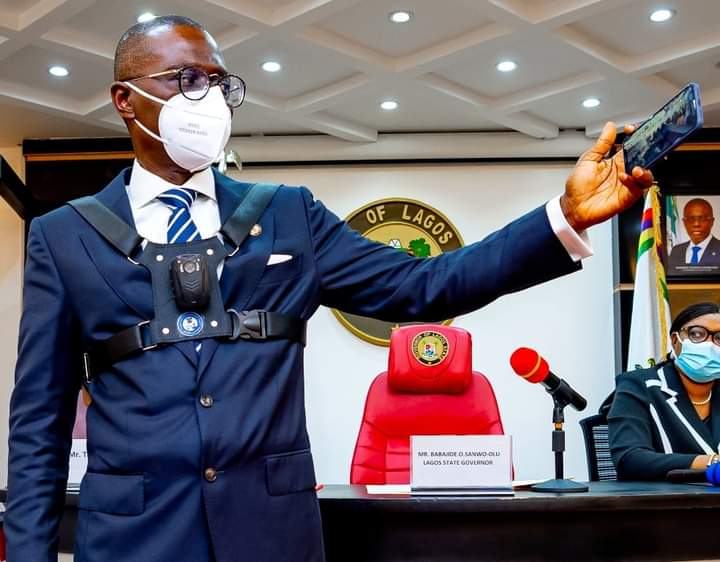• ‘Initiative Will Enhance Safety, Boost Investors’ Confidence’ – Governor Sanwo-Olu
Governor Babajide Sanwo-Olu, on Wednesday, rolled out a groundbreaking plan for the enhancement of security and safety in Lagos State. The Governor approved a mass training for the State’s law enforcement personnel on the use of body worn cameras, ahead of the deployment of the digital tools for security operations across the State.
The three-day training, which will commence in May, will be facilitated by the State’s Law Enforcement Training Institute (LETI), headed by Prince Oyekan Falade. After the training, all State-funded law enforcement officers will be commissioned to wear body cameras for their operations.
Sanwo-Olu said the move would improve transparency and accountability in the activities of law enforcement agencies, and put the State Government in a better position to respond to security challenges in real time.
Provision of adequate security, the Governor said, is a key pillar of his administration’s T.H.E.M.E.S. agenda, stressing that the initiative reflected his Government’s resolution to ensure Lagos remained secure for residents and investors.
He said: “I am pleased to inaugurate the use of body-worn cameras by law enforcement officers in Lagos and this is a groundbreaking move to enhance safety in the State, as well as increase transparency and accountability in the activities of our law enforcement agencies. Lagos State has strategically set the pace among other States in Nigeria to launch the use of body worn cameras by law enforcement officers.
“The security challenges in different parts of the country are worrisome, but with proactive action, the use of modern technological tools, and a mix of well-trained and intelligent officers, we will successfully combat many of these challenges. With body-worn cameras, our law enforcement officers are better equipped to protect lives and properties, thereby, making Lagos safer for us all.”
Sanwo-Olu said the launch of the body-worn cameras would take the Government a step closer towards fulfilling its security agenda, stressing that the introduction of devices to frontline security team and officers would enhance their productivity and professionalism, while also fast-tracking law enforcement process.
The cameras, the Governor pointed out, will help the State Government check abuse of power and excesses by security personnel, while also improving the safety and accountability of officers, who will use the devices for evidence sharing and intelligence gathering.
“I am hopeful that all officers will optimise the cameras that will be assigned to them for the furtherance of justice and improvement of the law enforcement process. Our Government will continue to prioritise the welfare of our law enforcement officers whose pivotal efforts we acknowledge in the entrenchment of a safe city,” Sanwo-Olu said.
Permanent Secretary of the Ministry of Justice, Mrs. Khadijat Shittabey, applauded the Governor for approving the initiative, stressing that the body worn cameras would help the ministry in the administration of justice.
She said: “The cameras will also help to enhance professionalism on the part of the law enforcement agents, provide digital evidence of events and provide additional means of protection for officers. The cameras will be used to establish guilt or innocence of officers when confronted with allegations of wrongdoing.”
Falade, after demonstrating the operation of the camera on the Governor, said 7,000 officers will be trained in the Lagos State Traffic Management Authority (LASTMA), Vehicle Inspection Service (VIS), Lagos Neighborhood Safety Corps (LNSC), and the Lagos Environmental Sanitation Corps (LAGESC).
The training, LETI boss disclosed, will be done in 26 batches to reduce crowding of the training centre.
LETI was established in 2013 through an Executive Order, to set standards for recruitment of law enforcement agents, training and development of the officers.
